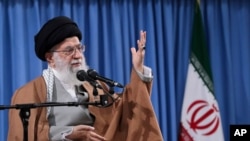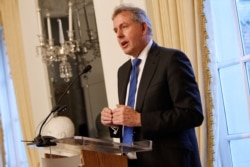This story was updated on July 16 at 7:50 am.
Iranian Supreme Leader Ayatollah Ali Khamenei said Tuesday the country would continue to reduce its commitment to the 2015 nuclear deal, while reiterating accusations that European nations are not doing enough to help the Iranian economy deal with sanctions.
His comments followed those Monday from an atomic agency spokesman who said Iran's decreasing commitments to the agreement were done "not out of obstinacy" but to give the other parties a chance to "carry out their duties."
The nuclear deal calls on Iran to slash its uranium enrichment in exchange for sanctions relief from the United States and the five other signatories — Britain, China, France, Germany and Russia.
President Donald Trump called the agreement "horrible," pulled the U.S. out of it last year, and reimposed sanctions on Iran.
Iran has already withdrawn from parts of the agreement and threatens to back away even further unless the remaining countries help its sanctions-battered economy.
Iran has already exceeded the size of the uranium stockpile permitted under the deal and increased the uranium enrichment level, although it is still nowhere near what is needed to build a nuclear weapon.
But Iran's foreign ministry said it would stay committed to the accord at the same level as the other signatories stay committed to it.
British Foreign Secretary Jeremy Hunt said the 2015 deal "isn't dead yet," and that while the opportunity to find a resolution to the current crisis surrounding the agreement is closing, it is still possible to keep it alive.
He spoke ahead of talks with other European Union foreign ministers in Brussels where they plan to discuss the Iran situation.
Hunt's comments came after London's Mail on Sunday newspaper printed cables from former British ambassador to the U.S. Kim Darroch. The ambassador criticized Trump's decision to withdraw from the nuclear deal, saying he did it simply to snub his predecessor, President Barack Obama.
Darroch wrote in a May 2018 cable that the Trump administration "is set upon an act of diplomatic vandalism, seemingly for ideological and personality reasons — it was Obama's deal."
The Mail on Sunday had already published other leaked cables where Darroch called Trump "inept," "insecure" and "incompetent" and his administration as "uniquely dysfunctional."
Darroch resigned from his post last week. The leaked cables were meant to be seen only by senior British ministers and civil servants. British officials launched an investigation of the leaks but did not deny the accuracy of Darroch's comments, expressing the opinion that the person likely responsible for the leak was someone inside the British government, not a foreign power.












